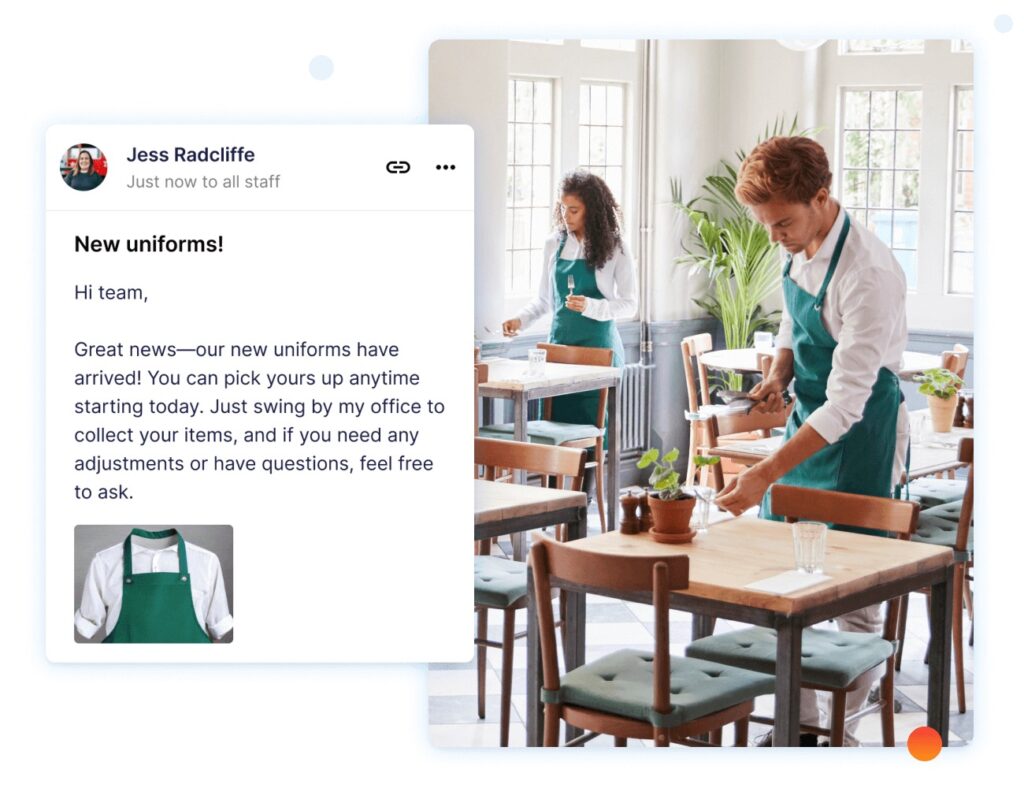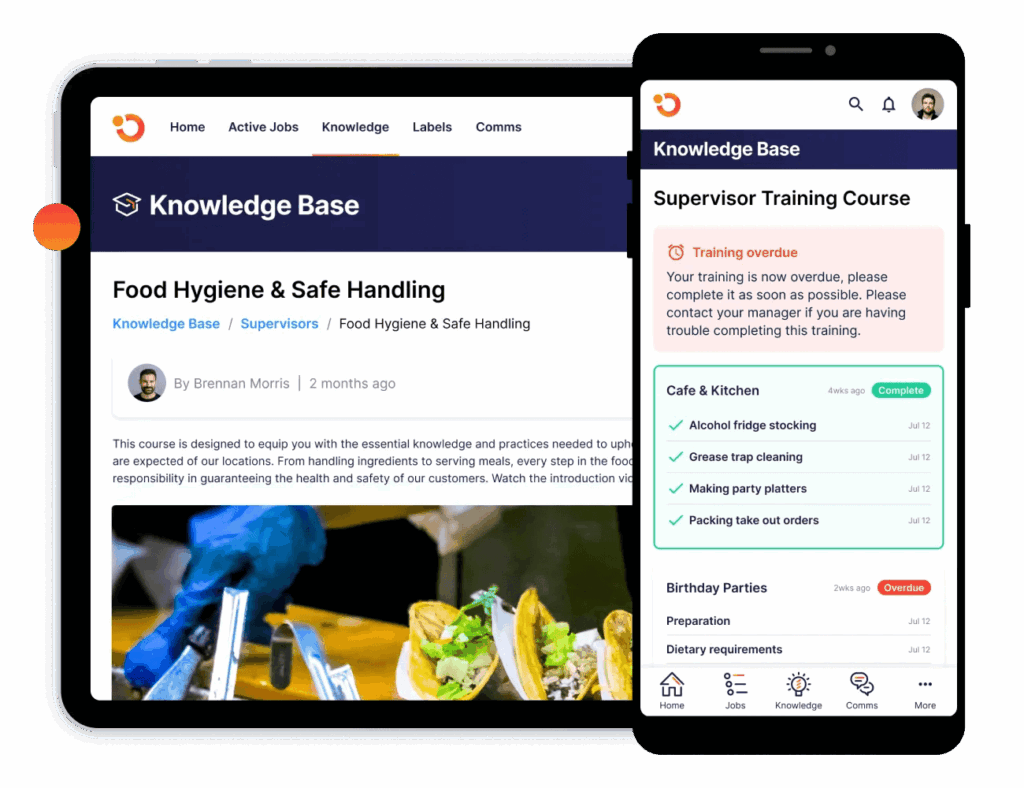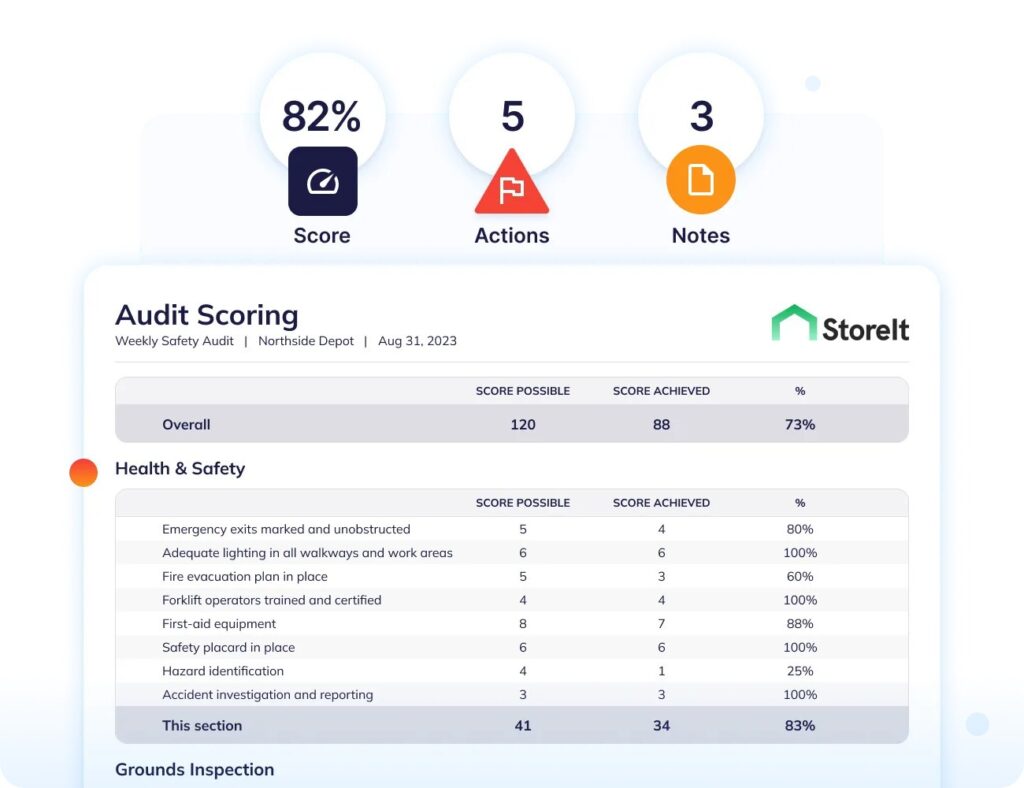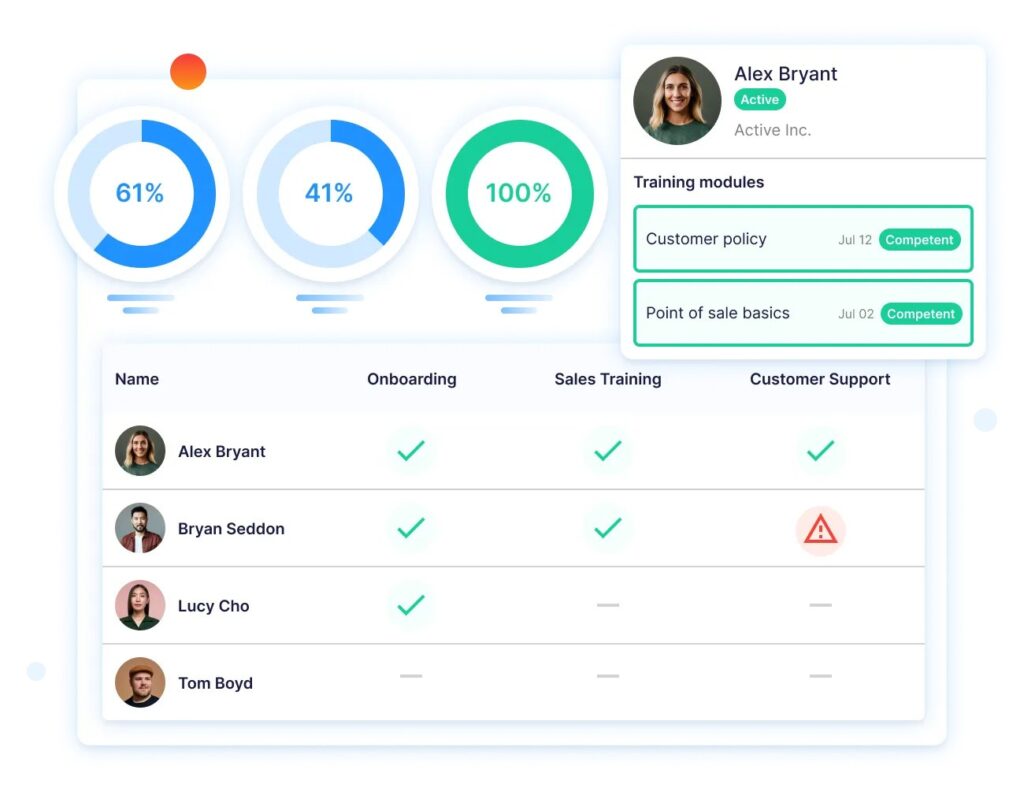Food Safety Culture: Definition, Examples & How to Improve It (2026)
Key Takeaways
- Food safety culture isn’t a policy. It’s the everyday attitudes and behaviors your teams bring to the job, especially when no one is watching.
- A strong food safety culture grows from five pillars: committed leadership, consistent training, open communication, clear accountability, and continuous improvement driven by fundamental data.
- The reliable KPIs for measuring food safety culture include audit scores, incident trends, training completion, and on-site task performance. These metrics reveal which locations need support long before inspectors show up.
- Tools like Operandio help operators make this culture real by unifying food safety tasks, training, and compliance checks into a single system that your entire team can follow every day.
One missed temp check at one location shouldn’t put your entire brand at risk, yet it happens all the time.
That’s why food safety culture matters. It’s the only way to make sure every team, in every kitchen, follows the same safe habits even when no one is watching.
In this guide, you’ll learn what food safety culture really means, how it works, and the steps to build it across all your sites. You’ll also see the core pillars, examples, and the tools that help you keep standards high across every shift. Let’s break it down.
What Is Food Safety Culture?
Food safety culture refers to the shared values, beliefs, and behaviors that reflect how seriously your team takes food safety compliance.
The FDA calls it “the shared values, beliefs, and norms that shape mindset and behavior toward food safety.”
The British Retail Consortium Global Standards (BRCGS) adds that authentic culture requires proactive safety habits, not just reaction after something goes wrong.
Here’s the simple difference:
Food safety systems outline what to do — HACCP plans, temperature logs, audits, and cleaning schedules.
Food safety culture is whether people do those things every day, even when no one is watching. You can have strong digital food safety solutions and still fail if your culture is weak.
Modern standards take this seriously. The Global Food Safety Initiative (GFSI) and the FDA’s Food Safety Modernization Act (FSMA) now expect businesses to assess and strengthen culture, not only maintain documents.
Most violations happen because of human behavior, not a lack of knowledge. When teams believe food safety matters — and see leaders reinforce it — they follow procedures with consistency. Without that culture, even the best food safety compliance tools can’t prevent failure.
Pillars of a Strong Food Safety Culture
Strong culture rests on five pillars:
Pillar #1: Leadership Commitment
Leaders who prioritize food safety in their actions, not just their words, set the tone.
When executives and managers visibly follow protocols, allocate budget for safety tools, and hold themselves accountable to the same standards as frontline staff, teams notice.
Leadership means checking dashboards for food safety compliance gaps, addressing violations immediately, and celebrating teams that maintain perfect records.
Pillar #2: Comprehensive Training

A one-time onboarding program isn’t enough.
Regular refresher courses, certification tracking, and quick-access knowledge bases keep information up to date.
For multi-unit operators, centralized training management ensures every location teaches the duplicate content to the same standard.
Pillar #3: Open Communication

Open communication means managers encourage staff to speak up about broken equipment, confusing procedures, or practices that create risk.
It also means clear documentation of task completion, incident reports, and corrective actions.
Pillar #4: Clear Accountability
Clear accountability means real-time visibility into task completion, automatic alerts for missed procedures, and audit trails that document every action.
Multi-unit operators need systems that flag incomplete tasks across all locations, so the corporate can identify patterns and provide support before violations occur.
Pillar #5: Continuous Improvement
Finally, a strong culture evolves based on data. Continuous improvement means reviewing audit results, analyzing incident trends, and updating procedures to address root causes.
It requires a robust food safety management system with reporting tools that surface patterns across locations and task types, so you spot systemic issues early.
You can use food safety monitoring tools and food traceability systems to track patterns and make data-driven decisions.
How to Build a Strong Food Safety Culture

Understanding the pillars is one thing. Implementing them is another. Here’s how to put each pillar into action with practical steps that work across multiple locations.
1. Secure Leadership Commitment at Every Level
Get your leaders to commit, demonstrate commitment through visible actions, and ensure consistent accountability.
Hold Leadership to The Same Standards
When leaders understand procedures firsthand, they make better decisions about resources and priorities.
Review Compliance Data Regularly
Schedule weekly reviews of food safety monitoring data across all locations. Look at which sites maintain perfect records and which need support. Use these reviews to celebrate successes and allocate resources to struggling locations.
Budget for Proper Tools
Allocate funds for restaurant food temperature monitoring sensors, digital checklist platforms, and training programs. When leadership invests in the right tools, staff recognize that food safety matters.
Respond to Violations Immediately
When restaurant audits reveal problems, address them within 24 hours. Document corrective actions, verify completion, and communicate changes to all affected locations. Delayed responses signal that violations aren’t serious.
2. Train Your Staff Thoroughly and Repeatedly
Comprehensive training builds the knowledge and skills staff need to execute food safety procedures correctly every time.
Critical Training Topics
The Importance of Handwashing
Proper handwashing prevents the spread of harmful bacteria that cause foodborne illness. Train staff on when to wash their hands (after touching raw food, using the restroom, and handling cash), how long to scrub (at least 20 seconds), and which soap to use. Hang visual posters near sinks that show the correct technique.
Temperature Control Fundamentals
Your staff must understand why temperature control matters, not just what temperatures to maintain.
Explain that bacteria multiply rapidly in the “danger zone” (41°F-135°F) and why refrigeration failures waste inventory.
Remember to Conduct Refresher Courses

Schedule refresher courses quarterly to reinforce critical principles and update staff on procedure changes.
You can track completion through your learning management system to identify who needs follow-up training.
3. Create Open Communication Channels
Healthy dialogue between management and staff ensures concerns get addressed before they become violations.
Encourage Immediate Incident Reporting
Make it easy for staff to report broken equipment, temperature irregularities, or safety concerns the moment they notice them.
Digital platforms with mobile apps let employees document issues with photos and timestamps. When staff know you’ll act on reports quickly, they keep reporting.
Communicate With Customers About Allergens
Display allergen information clearly on menus and train staff to discuss dietary restrictions confidently. Post health certifications visibly, transparency builds trust with patrons and reinforces to staff that safety matters.
4. Establish Clear Accountability Systems
Accountability ensures procedures are followed consistently.
Set Up Automatic Alerts For Missed Procedures
Configure alerts that notify managers when critical tasks run late. If a location hasn’t logged cooler temperatures by 10 AM, the system flags it immediately. Automatic alerts create accountability without the need for constant manual checking.
5. Commit to Continuous Improvement
Strong culture requires ongoing evaluation and refinement based on operational data.
The food service industry evolves with new regulations and best practices. Using a reliable food safety management system helps you stay current by simplifying checklist updates.
When regulations change, update digital checklists once and deploy them across all locations instantly.
How to Measure and Sustain Food Safety Culture
A strong food safety culture demands ongoing evaluation through key performance indicators that reveal whether behaviors align with expectations.
Track Audit Scores Consistently

Health inspection results provide objective measures of compliance. Track scores across all locations and over time to identify trends. Which locations consistently score high and which need support? Use franchisee monitoring tools to compare performance and provide targeted coaching.
Monitor Incident Rates and Near Misses
Count how often food safety incidents occur, customer complaints, temperature violations, and equipment failures. Include near misses because they reveal vulnerabilities before they become violations. Declining rates signal improving culture; rising rates demand investigation.
Measure Training Completion and Certification Status

Track what percentage of staff complete required training on time and maintain current certifications. Low completion rates indicate unclear expectations or cultural problems. High completion rates with declining performance suggest the training content needs improvement.
Use Digital Dashboards for Real-Time Visibility
Centralized operational reporting software consolidates KPIs into visual dashboards showing compliance trends, training completion, and audit scores across all locations. Real-time visibility lets you spot problems immediately.
Advanced restaurant analytics and reporting tools let you drill down into specific locations or time periods.
Common Challenges in Establishing Food Safety Culture
Even with the right approach, you’ll face obstacles. Here are the five most common challenges and how to address them.
Challenge #1: Inconsistent Execution Across Multiple Locations
Managers interpret procedures differently, equipment setups vary, and staff create shortcuts.
This inconsistency exposes your entire brand to risk. Use unified digital checklists so every site follows the same steps consistently.
A centralized restaurant quality control systems ensure everyone follows the same steps.
Challenge #2: Low Staff Adoption of New Procedures
Teams resist new procedures when they feel complex or disconnected from daily work. They fall back on old habits because it feels easier. Solve this by using tools that fit into existing workflows.
But when food safety checklists sit in the same app staff already use for opening tasks, adoption becomes effortless.
Challenge #3: High Turnover Disrupts Training and Knowledge Transfer
High turnover forces constant retraining, and every exit takes knowledge with it.
Reduce the impact by using centralized training tools that track completions and store all reference materials in one place.
When training lives in the cloud, the knowledge stays, even when staff don’t.
Challenge #4: Competing Priorities During Service Periods
During rush periods, food safety competes with speed and customer satisfaction. Staff feel pressure to skip handwashing or defer cleaning.
The solution isn’t choosing between safety and efficiency; it’s building systems that make safety efficient. QSR managers can simplify daily operations by using platforms that streamline task completion and provide quick mobile access to procedures.
Strengthen Your Food Safety Culture With Operandio
Operandio brings food safety, training, temperature checks, and daily tasks into one platform your team already uses. When everything lives in the same workflow, staff follow protocols without extra steps. You see which sites completed their checks, which teams need support, and where issues appear before an inspector ever arrives.
If you want every location working to the same standard, Operandio gives you the control and clarity to make it happen.
Ready to build a stronger food safety culture? Visit Operandio to transform compliance from a checkbox into a culture.


